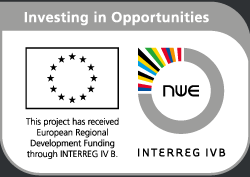A leading community gardening group has continued its transformation of Torquay station on the Riviera Line, planting tulips supplied by Citizens’ Rail’s Dutch partner, Parkstad Limburg.
The First Great Western Station Adoption project gives people with learning disabilities the opportunity to learn new skills and to work towards a nationally recognised qualification. The group’s weekly gardening work at Torquay station (showcased in the video below) has been shortlisted in the Best Social Enterprise and Community Impact category at the forthcoming 2014 Herald Express Business Awards. Learner David Maltby said of the project: “I love doing it, it’s so brilliant.”
The work on the station rockery has been supported by funding from Citizens’ Rail, the EU project to develop local and regional railways including the line between Torbay and Exeter.
Now the spirit of international cooperation has seen the group planting Dutch tulips donated on a recent visit by Paul Alzer from Citizens’ Rail’s Dutch partner Parkstad Limburg, a region near the southern border with Germany and Belgium.
Paul Alzer said: “Citizens’ Rail is about sharing ideas and putting people at the heart of their local and regional railways. It’s nice that our small Dutch tulip bulbs are growing in such a great initiative abroad.”
Celia Minoughan, Citizens’ Rail Riviera Line Officer for the Devon & Cornwall Rail Partnership, said: “The group were delighted with the bulbs, and it was great to hear their plans to expand the project and bring more colour to all of Torbay’s stations in future.”
Nicky Church, ROC Personalisation Manager commented: “The people who we support have devoted their time, enthusiasm and sheer hard work into this project and are doing so with a view to gaining the necessary skills and experience to get a job.”
Local partners in Citizens’ Rail – which is 50% funded by the EU’s Interreg IVB programme – include Devon County Council, Torbay Council, First Great Western, Plymouth University and the Devon and Cornwall Rail Partnership.
Find out more about ROC’s work across the UK to help as many people as possible who have learning or similar disabilities to be who they want to be. Visit the ROC website.




